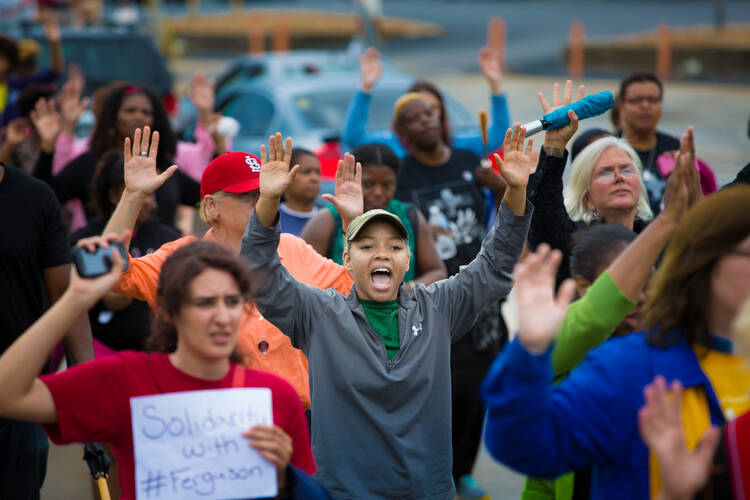The city whose name has become synonymous with racial conflict is not at all what I was expecting. I visited Ferguson, Missouri, for the first time earlier this month on assignment for PBS-TV. Yes, there are still boarded-up, burnt buildings—reminders of the sometimes violent protests that followed last August’s the shooting of an unarmed black teenager by a white officer. Yes, there are still barricades surrounding police headquarters and curbside memorials to shooting victim Michael Brown.
But Ferguson is also a town of attractive neighborhoods, of two-story homes with wide porches where middle class families, black and white, can still afford to buy. There are “We Love Ferguson” signs on lawns. There are churches where both races worship side by side on Sundays.
Ferguson is beginning to heal.
Religious leaders are helping to bring about that change. Deacon Mark Byington of St. Joseph Church in the St. Louis suburb of Bonne Terre is himself a former Dallas police officer. After violence followed a Grand Jury’s decision in November not to indict the officer, Byington wondered if there was some way to construct internal change in the police department, not just in policies and procedures, but in hearts.
That led the deacon to this idea: an inter-denominational weekend of reflection for Ferguson area officers. Already 40 officers have signed on for the retreat, which will take place at the White House, a Jesuit retreat Center overlooking the Mississippi.
“I really hope to help officers come back to their center, so they have peace in their own hearts,” Byington says. The retreat, he says, will provide what no amount of training at the police academy can give them: silence, solitude and a chance to process their feelings.
“The key thing of those three things is silence, to get rid of all the noise that goes on,” Byington says. “If you’ve ever ridden in a squad car, you’ll understand that it’s constant noise: the radio, the car itself, you’re working with a partner you’re continually having to dialogue with. There’s no time to think.”
Officer Trevor Wild, a 19-year-veteran, was called in from nearby Franklin County to reinforce the Ferguson police when rocks and bottles were flying. “Personally, I’m in uncharted waters,” he says of the need to move forward with change. “I had never experienced anything in my law enforcement career like the protesting.”
The officers helping Byington to plan the retreat have chosen a name for their group: The Peacemakers.
“An officer goes on a domestic violence call, well, he’s not keeping the peace. The peace is, in a sense, already lost. He’s trying to bring it backs. And so that’s a peacemaker, not a peacekeeper. That’s where the name comes from,” the deacon says.
To foster a sense of peacemaking, Byington intends to use another word he says doesn’t come up often up in at the police academy: humility.
Although 40 officers out of the hundreds that serve the St. Louis area may seem like a drop in the ocean, both Byington and Wild insist it’s a good start.
“Let’s say we have those 40 officers and they’re spread out. They’re creating these rings of peace, and when they walk into a room, so it’s not just police presence, it’s peace presence. They’re bringing everyone’s anger or aggressions down by their mere presence,” Byington says.
Adds Wild: “I think that this nucleus of people will draw more people. And I think it will take off because stress accumulates, and this is a way to get rid of that.”
Byington has already selected the prayers he will focus on during the retreat: the famous prayer of St. Francis, which begins, “Lord make me an instrument of your peace” and Trappist monk Thomas Merton’s famous reflection from Thoughts In Solitude, which begins, “My Lord God, I have no idea where I am going” and ends with the words, “I will fear not, for you are ever with me, and you will never leave me to face my perils alone.”
The deacon says he plans to offer similar retreats as long as they are needed in Ferguson. He hopes The Peacemakers continue meeting monthly once the retreat is over, and that police officers across the country will be inspired by Ferguson to form similar groups.








